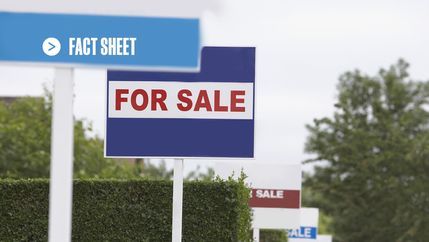
England has defined rules which means that agents do not need to apply for planning permission, which are set out by the Town and County Planning (Control of Advertisements) Regulations 2007 (TCPR).
Planning enforcement can restrict the use of deemed consent, but local authorities will primarily act on any public safety concerns raised by complaints around agents’ boards. If agents are uncertain about whether consent is required, they should contact their local planning authority.
Restrictions and best practices
All advertisements, whether they require consent or not, are subject to standard conditions and cannot be displayed without permission from the owner of the site. Both the board and the site used to display it must be kept clean, tidy, and in good repair. Once a board is removed, the site must be left in a safe condition.
Size, location and duration
Single boards for residential properties must be no larger than 0.5m square. For other properties, such as agricultural, industrial, or commercial, they can be a maximum of 2m square. For buildings, they usually must be no higher than 4.6m above the ground and not project more than 1m from the face of the building.
The advertisement should be removed within 14 days after the completion of a sale or granting of a tenancy.
There are specific rules about the location of boards for different types of sales and our fact sheet provides more detail to assist Propertymark members comply. We also have some Assured Advice on joint agency boards.
Enforcement
Local planning authorities can issue a Discontinuance Notice under Regulation 8 of the TCPR if they believe that there is risk of substantial damage to property or a danger to the public.
An agent must comply with the Notice within eight weeks or risk prosecution which could result in a maximum fine of £2,500.
Previous council action
In 2021 Harlow Council decided to pursue a policy of enforcement using the legal tools available, including the removal of boards and, where appropriate, the use of Fixed Penalty Notices.
In 2019 Camden Council sought UK Government backing for a borough-wide Section 7 direction - effectively banning all agents’ boards being erected without first securing planning consent. The Council claimed it had received over 1,000 complaints about sales and lettings boards over the previous five years.
And Camden Council - along with nearby London Boroughs of Southwark and Lewisham - issued some fixed penalty notices in 2018 and 2019 on agencies.
Some areas like Brighton and Hove Council have, since 2010, limited bans on boards in some locations - typically conservation areas - with a £1,000 penalty for agencies breaking the rules.
Fact sheet: Town and Country Planning (Control of Advertisements) Regulations 2007
The regulations set out the rules for advertising boards, including property sales and lettings boards. They came into force on 6 April 2007 and apply in relation to the display of advertisements on sites in England only.





